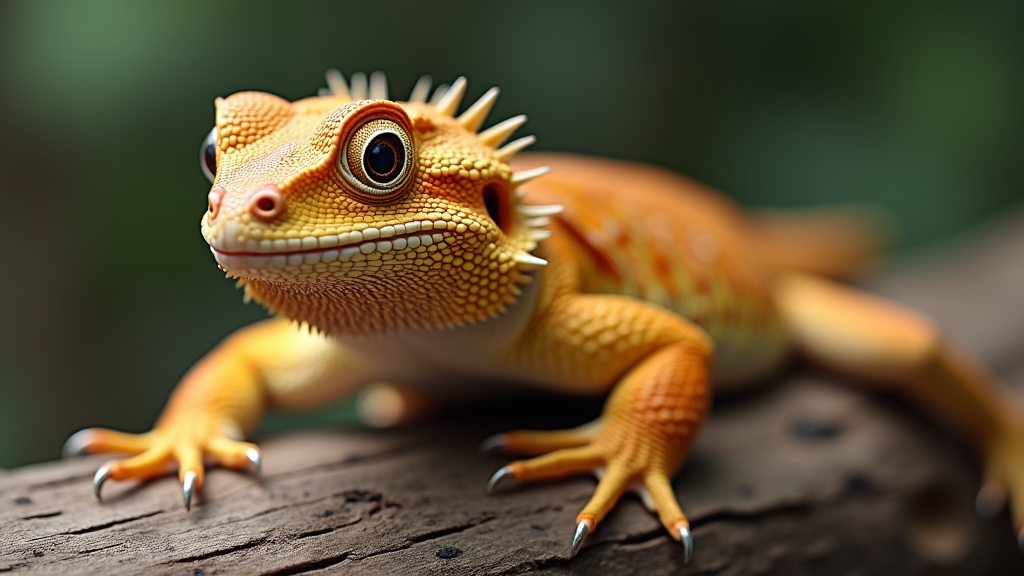Bearded dragons are fascinating reptiles that make endearing pets, but like humans, they can experience stress and anxiety. Recognising and alleviating these conditions is crucial for maintaining the health and happiness of your scaly companion. In this blog, we will delve into the causes, symptoms, and solutions for stress and anxiety in bearded dragons. Our goal is to provide you with actionable advice that will help you ensure your bearded dragon leads a comfortable and stress-free life.
Causes of Stress and Anxiety in Bearded Dragons
Environmental Factors
Temperature and Lighting: Bearded dragons are highly sensitive to their environment. Inadequate temperatures and improper lighting can create significant stress. Ensure their habitat maintains a daytime temperature of 24-29°C (75-85°F) with a basking area of 35-40°C (95-105°F). Proper UVB lighting is essential to prevent metabolic bone disease and other health issues.
Enclosure Size: An enclosure that is too small can lead to stress and anxiety. Young bearded dragons thrive in a 20-gallon tank, but adults require at least a 50-75 gallon tank to explore and feel secure.
Social Stressors
Handling: Frequent or improper handling can cause significant stress. From my years of experience, gentle and consistent handling for short periods initially helps build trust. Always support their body fully to make them feel secure.
Other Pets: The presence of other pets, especially if they show predatory behaviour, can be a source of constant anxiety. Keep the enclosure out of sight or reach from potential threats and create a peaceful environment.
Diet and Feeding Issues
Inconsistent Feeding Schedule: Bearded dragons thrive on routine. Sudden changes or an inconsistent feeding schedule can cause stress. Try to feed them at the same times each day.
Dietary Imbalance: A diet lacking essential nutrients can lead to health issues that cause stress. Offer a balanced diet of insects and vegetables, ensuring you dust food with calcium powder to prevent deficiencies.
Recognising Signs of Stress and Anxiety
Physical Symptoms
Loss of Appetite: A stressed bearded dragon might refuse to eat. If you notice your dragon’s appetite waning, consider potential environmental or dietary issues.
Changes in Colour: Bearded dragons might darken in colour when stressed. This is often a response to feeling threatened or uncomfortable.
Behavioural Symptoms
Glass Surfing: This behaviour, where the dragon repeatedly scratches at the glass, can indicate stress. It’s often a sign they feel confined or exposed.
Lethargy: A normally active dragon that becomes lethargic may be experiencing stress. Monitor for other health issues and consult a vet if symptoms persist.
Social Cues
Aggressive Behaviour: Displaying aggression, such as puffing up their beard or hissing, can be a sign of stress or feeling threatened. Understand the triggers and work to mitigate them.
Reducing Stress and Anxiety in Bearded Dragons
Optimising the Environment
Proper Habitat Set-Up: Make sure the enclosure offers plenty of hiding spots, appropriate temperatures, and UVB lighting. Adding branches and rocks can provide enrichment and reduce stress.
Routine Cleaning: Keep the habitat clean to prevent illness and discomfort. Regularly spot clean and perform thorough clean-ups at least once a month.
Interactive Solutions
Gradual Introduction to Handling: Start by letting your dragon get used to your presence. Gradually increase handling time, ensuring each session is calm and supportive. Over time, this can reduce anxiety related to handling.
Providing Enrichment: Offering toys, new climbing structures, or safe supervised time outside the cage can reduce boredom-induced stress.
Dietary Adjustments
Consistency is Key: Maintain a consistent feeding schedule to establish a routine that your dragon can rely on.
Hydration and Nutrition: Ensure your bearded dragon is well-hydrated and receiving a balanced diet. Occasionally offer treats like mealworms or fruits to stimulate interest in food.
Conclusion
Understanding and addressing stress and anxiety in bearded dragons is vital for their well-being. By paying attention to environmental factors, recognising signs of stress, and implementing measures to reduce anxiety, you can help your bearded dragon live a happy, healthy life. Always remember, if you’re unsure about any health concerns, consult a vet for professional advice.
If you found this post helpful, feel free to explore other articles on our blog about bearded dragon care and pet health tips.
Meta Description
Learn how to identify and reduce stress and anxiety in bearded dragons. Get practical tips on environmental, dietary, and social factors to keep your pet happy and healthy.
Feel free to connect with me if you need any more personalised advice or have other questions about your exotic pets!
Check out our recommended UVB lighting solutions and other essential products here.

